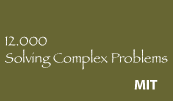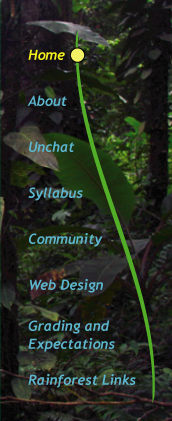


"Solving Complex Problems" is a nine-unit subject designed to provide students with the opportunity to work as part of an "imagineering" team to design a viable solution to a complex problem that requires an interdisciplinary approach. For students participating in the Fall 2002 offering, the mission ("Mission 2006") is:
Develop a way to characterize and monitor the well-being of one of the last true frontiers on Earth – the Amazon Basin rainforest – and devise a set of practical strategies to ensure its preservation.
We know remarkably little about the physical, chemical and biological processes that shape the evolution of rainforest ecosystems, yet such knowledge is crucial if we hope to implement effective plans for the management of this unique resource. Exactly how the necessary knowledge base can be developed with currently available technologies, and how we might use that knowledge to improve our stewardship of Amazonia, is subject to heated debate. There is no "correct" answer to this problem set....
Students
will break Mission 2006 down into well-defined tasks, and each task will
be assigned to a team of between five and ten students. Each team will
be assisted by two upper-class teaching fellows, and they will be able
to rely on one or more "Alumni Mentors" for advice and encouragement.
In addition, students may wish to take advantage of the expertise of our
core of "Specialty Advisors": scientists, engineers, and businesspeople
who can provide special insights into the problems associated with living
in or working on the rainforest ecosystem.
NEW
12/05/02
- The bios for panelists
who will be present at the final presentation are now available for students
to see.
12/02/02 - The final
presentation will take place in 34-101 on Friday, Dec. 6th 2002, starting
at 7:15pm, and will be open to public. It will be webcast
live starting at 7:30pm. The final website by students in this class
is http://web.mit.edu/12.000/www/m2006/final/
.
11/13/02 - Raytheon presentation on SIVAM.
Mission 2006 - MIT subject 12.000 is taught by Prof. Kip Hodges and Prof. Rafael Bras. The links to the left connect you to pages with more details:
...provides information about the history of 12.000
...is a portal to the discussion environment we use for virtual meetings and decision making
...reveals the class schedule and links to assignments
...identifies students and their teams, graduate teaching assistants, upperclass teaching fellows, alumni mentors, and technical advisors
...provides advice on developing effective web sites for 12.000
...discusses how the subject is graded and what the teaching staff expects from students in 12.000
...leads to a variety of useful resources